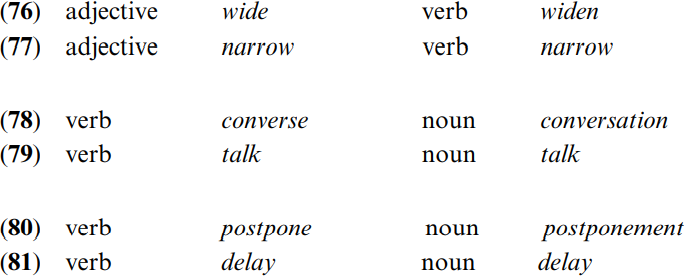

Grammar


Tenses


Present

Present Simple

Present Continuous

Present Perfect

Present Perfect Continuous


Past

Past Simple

Past Continuous

Past Perfect

Past Perfect Continuous


Future

Future Simple

Future Continuous

Future Perfect

Future Perfect Continuous


Parts Of Speech


Nouns

Countable and uncountable nouns

Verbal nouns

Singular and Plural nouns

Proper nouns

Nouns gender

Nouns definition

Concrete nouns

Abstract nouns

Common nouns

Collective nouns

Definition Of Nouns

Animate and Inanimate nouns

Nouns


Verbs

Stative and dynamic verbs

Finite and nonfinite verbs

To be verbs

Transitive and intransitive verbs

Auxiliary verbs

Modal verbs

Regular and irregular verbs

Action verbs

Verbs


Adverbs

Relative adverbs

Interrogative adverbs

Adverbs of time

Adverbs of place

Adverbs of reason

Adverbs of quantity

Adverbs of manner

Adverbs of frequency

Adverbs of affirmation

Adverbs


Adjectives

Quantitative adjective

Proper adjective

Possessive adjective

Numeral adjective

Interrogative adjective

Distributive adjective

Descriptive adjective

Demonstrative adjective


Pronouns

Subject pronoun

Relative pronoun

Reflexive pronoun

Reciprocal pronoun

Possessive pronoun

Personal pronoun

Interrogative pronoun

Indefinite pronoun

Emphatic pronoun

Distributive pronoun

Demonstrative pronoun

Pronouns


Pre Position


Preposition by function

Time preposition

Reason preposition

Possession preposition

Place preposition

Phrases preposition

Origin preposition

Measure preposition

Direction preposition

Contrast preposition

Agent preposition


Preposition by construction

Simple preposition

Phrase preposition

Double preposition

Compound preposition

prepositions


Conjunctions

Subordinating conjunction

Correlative conjunction

Coordinating conjunction

Conjunctive adverbs

conjunctions


Interjections

Express calling interjection

Phrases

Sentences


Grammar Rules

Passive and Active

Preference

Requests and offers

wishes

Be used to

Some and any

Could have done

Describing people

Giving advices

Possession

Comparative and superlative

Giving Reason

Making Suggestions

Apologizing

Forming questions

Since and for

Directions

Obligation

Adverbials

invitation

Articles

Imaginary condition

Zero conditional

First conditional

Second conditional

Third conditional

Reported speech

Demonstratives

Determiners


Linguistics

Phonetics

Phonology

Linguistics fields

Syntax

Morphology

Semantics

pragmatics

History

Writing

Grammar

Phonetics and Phonology

Semiotics


Reading Comprehension

Elementary

Intermediate

Advanced


Teaching Methods

Teaching Strategies

Assessment
Word derivations
المؤلف:
R.M.W. Dixon
المصدر:
A Semantic approach to English grammar
الجزء والصفحة:
56-2
2023-03-13
2166
Word derivations
English has a number of derivational affixes that change word-class membership, but each applies to a limited set of words. Nouns formed from verbs include amusement, punishment; suggestion, conclusion; blessing, singing; resemblance; pleasure; Among adjectives derived from verbs are adorable, persuasive, contributory. Verbs derived from adjectives and nouns include purify, glorify; equalize, itemize; blacken, lighten, threaten. Most of these derivational endings are of French or Latin origin (notable exceptions being -en and -ing).
Quite a number of English words appear to belong to more than one word class, e.g.
adjective and verb: dirty, clean, tidy, narrow
noun and verb: stone, butter, bridge, cash
verb and noun: walk, punch, look, sleep, catch, laugh, roast
In each case, speakers have a clear intuition that one word-class membership is primary and the other secondary. Stone is said to be firstly a noun, although it can also be used as a verb (e.g. Stone the Christians!). Walk is regarded as a verb, which can also be used as a noun (That walk tired me out). In the tabulation just given, the primary word-class membership is given first (as, indeed, it generally is in dictionary entries).
There are two ways of dealing with the facts reported in the last paragraph. One is to say that stone, butter, etc. are nouns pure and simple, while walk, punch, etc. are verbs, and then to state that all nouns may be head of an NP, but a subset of nouns (stone, butter, etc.) may also function as head of a VP (taking appropriate verbal endings); and that all verbs can be head of a VP but that a specified subset of verbs (walk, punch, etc.) can also be NP head (and will then take appropriate nominal endings). The other approach is to say that the head of a VP can only be a verb, etc., and that English has derivational processes, with ZERO marking, that derive verbs from some nouns (verb stone from noun stone), and so on.
Evidence for preferring the second (zero derivation) alternative in the case of English comes from considerations of pairs like:

The words in each pair have related meanings. In each instance the first line shows an affix marking a derivational process. By analogy, it seems most satisfactory to say that the second line also involves a derivational process, with zero marking.
A further piece of evidence comes from examination of which words in a given semantic set may have double class membership. Consider:

It will be seen that, in each row, the most generic and commonly used noun also undergoes zero derivation to function as a verb, while those with more specific meanings lack this derivation.
In summary, English lacks a full array of productive derivational affixes; the suffixes (mostly of foreign origin) that are used each occur with a restricted set of roots. As a result there is much use of ‘zero derivation’, i.e. use of a noun in verb function without any change in form, etc.
Some generalizations are possible. Many verbs referring to CORPOREAL function can also be used as nouns, e.g. bite, swallow, drink, sniff, smell, taste, laugh, cry, sob, weep, wink, kiss, hug, pee. And many nouns referring to implements can also be used as verbs, e.g. spear, knife, saw, hammer, whip, nail, screw.
We will provide a full discussion of the eight types of nominalizations from verbs, and their markings—zero derivation, and also suffixes -er, -ant, -ard, -ing, -ation, -ment, -ance, etc. (Most suffixes mark several different kinds of nominalization, with different verbs.)
 الاكثر قراءة في Semantics
الاكثر قراءة في Semantics
 اخر الاخبار
اخر الاخبار
اخبار العتبة العباسية المقدسة

الآخبار الصحية















 قسم الشؤون الفكرية يصدر كتاباً يوثق تاريخ السدانة في العتبة العباسية المقدسة
قسم الشؤون الفكرية يصدر كتاباً يوثق تاريخ السدانة في العتبة العباسية المقدسة "المهمة".. إصدار قصصي يوثّق القصص الفائزة في مسابقة فتوى الدفاع المقدسة للقصة القصيرة
"المهمة".. إصدار قصصي يوثّق القصص الفائزة في مسابقة فتوى الدفاع المقدسة للقصة القصيرة (نوافذ).. إصدار أدبي يوثق القصص الفائزة في مسابقة الإمام العسكري (عليه السلام)
(نوافذ).. إصدار أدبي يوثق القصص الفائزة في مسابقة الإمام العسكري (عليه السلام)


















